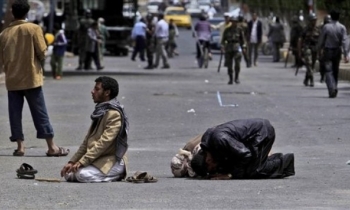Leading Egyptian editor Ibrahim Eissa will Wednesday face charges of publishing "fake news about the president's health which afflicted the national economy." If convicted, Eissa faces up to three years in prison and a fine of as much as 20,000 Egyptian pounds ($3,600).
This in the backdrop if the International Federation of Journalists (IFJ) condemning the Egyptian government over raids and threats that have forced an Internet journalist to go into hiding to escape police harassment.
Eissa, editor-in-chief of the daily Al-Dustour and one of Egypt’s top critics of President Hosni Mubarak’s 27-year rule, was charged under the Penal Code in September with publishing reports about Mubarak’s health that were “liable to disturb public security and damage public interest.”
The case was first hastily submitted to the Emergency State Security Court, an exceptional tribunal that does not allow for appeals and rarely issues acquittals. But it was examined later by a Cairo misdemeanour court following an outcry.
“Eissa’s prosecution shows how Egypt’s authorities shamelessly use the courts to punish outspoken journalists,” said Committee to Protect Journalists (CPJ) Executive Director Joel Simon.” The court should dismiss this politically motivated case once and for all.”
Eissa’s prosecution occurred in early September after First Lady Suzanne Mubarak told the satellite television station al-Arabiya that her husband’s health was “excellent” and that “there must be punishment either for a journalist, a television program, or newspapers that publishes the rumours.”
Al-Dustour was not the only or the first Egyptian paper to speculate about Mubarak’s health. “He has been singled out for prosecution because he keeps focusing on the issue of inheritance of power by Mubarak’s son, Gamal,” Mahmoud Kandil, one of Eissa’s lawyers told CPJ. “And the purpose is to find a scapegoat to prompt self-censorship about the inheritance and transition of power in Egypt.”
Kandil said that under the Penal Code, the court might sentence Eissa to up to three years in jail and a fine of up to 20,000 Egyptian Pounds (nearly US$3,600). In May, CPJ designated Egypt as one of the worst backsliders on press freedom, citing an increase in the number of legal and physical attacks on the press.
Eissa told New York-based CPJ that he currently faces 14 cases, most of them filed by members of the ruling national Democratic Party headed by Mubarak, who will turn 80 in May. They accused the editor of tarnishing the image of the country and harming the reputation of its leaders.
“They want to stifle this privately owned press, which is giving them a headache at a time when they want to smoothly hand power to the president’s son. The Egyptian authorities thought the time had come to topple and get rid of this privately owned press,” Eissa told CPJ.
Abdul-Jalil Al-Sharnouby, a member of the Egyptian Syndicate of Journalists (EJS) and editor in chief of the Ikhwanonline website—the official site of the Muslim Brotherhoodvhas had his home raided twice by security forces over coverage of the upcoming municipal elections.
In a letter to the board of the syndicate, Al-Sharnouby said security forces invaded his home in the early morning of March 12 while he was absent. They confiscated books, paper work and other belongings. “It scared my wife and my young daughters,” he said. He has now gone into hiding fearing that he will be detained.
“This journalist is being harassed and abused because of his work,” said Aidan White, IFJ General Secretary. “It is a shocking violation of his rights. The authorities must end this intimidation, return all the material seized in raids on his home and give guarantees of his personal safety.”
IFJ has pledged to fully support actions by the Egyptian Syndicate to protect its members and is concerned that Al-Sharnouby is targeted as part of the government campaign against Muslim Brotherhood activists in the run-up to municipal elections to take place on 8 April.
According to some reports around 800 Muslim Brotherhood politicians, activists and some journalists have been held. Among those detained is Khaled Hamza, the English editor of Ikhwanonline, who has been held in prison since February 20.
“The targeting of media associated with any political group threatens attachment to democratic principles, particular at election time,” said White. “This is precisely the time when standards of tolerance and democracy are most tested and when journalists should be allowed to work freely.”









